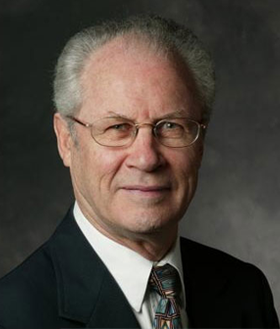heading
2007: Professor Perry L. McCarty
Professor Perry L. McCarty likes to think big but look small. He openly confesses an unabashed fascination with the inner workings of septic tanks, and his unbound excitement for getting behind the microscope to search for the next big thing in the sustainable and healthy reuse of water resources.

Receiving the 2007 Stockholm Water Prize from the hands of H.M. King Carl XVI Gustaf, he humbly joked to the audience that such passions may not be common among the average person. This is fitting, because the lifetime of pioneering achievement in the design and operation of water and wastewater systems for which he was recognized has been nothing short of extraordinary.
His journey began at Stanford University nearly half a century ago, when in 1962 he arrived at the Ivy League school to develop their environmental engineering and sciences program. But he has managed to do much more than build up a single academic institution’s department. Since beginning his post at Stanford, Professor McCarty’s work has defined the entire field of environmental biotechnology, which is the basis for small-scale and large-scale pollution control and safe drinking water systems.
“It is the community of organisms all working together that we need to study and learn more about. We ourselves obviously have much to learn about living together cooperatively, perhaps they can help us to learn how to do this much better than we have. With the coming climate changes we will have to adapt as well, and I hope we do it successfully. I expect we can if we all work together as the micro-organisms in a septic tank have learned to do,” says Dr McCarty.
“We ourselves obviously have much to learn about living together cooperatively, perhaps [micro organisms] can help us to learn how to do this much better than we have.”
The author of over 300 publications and textbooks on biological processes that can be utilized to control and remove environmental contaminants, such as nitrogen and hazardous chemicals, McCarty’s research has provided key insights in the movement, fate, and control of groundwater pollutants that have allowed for new opportunities in water reuse and applied advanced wastewater treatment.
As an icon and active member of the academic and professional community, Prof. McCarty has served numerous positions in addition to his role as teacher and researcher. He has in past and present worked in varying capacities as: Chairman of Stanford’s Department of Civil and Environmental Engineering, Director of the Western Region Hazardous Substance Research Center, and served in the National Academy of Engineering as well as the American Academy of Arts and Sciences. Before receiving the Stockholm Water Prize, he has been honoured with multiple awards including: the 1992 John and Alice Tyler Prize for Environmental Achievement and the 1997 Athalie Richardson Irvine Clarke Prize for Outstanding Achievements in Water Science and Technology.
His decorated career devoted to engineering solutions to better use and protect people and water resources has been dedicated to showing that we simply can not afford to waste water like we do. Therefore, to change this we must shift the way we view a much needed resource.
So called ‘wastewater’ is not waste at all, it is rather its value to society that is far too often wasted. Reduced pollution of groundwater resources and better utilization of the understanding of scientific and natural processes, to which Professor McCarty’s work has greatly contributed, provides countries the capacity to clean and recycle for reuse invaluable water resources.
While in Stockholm to receive the prize Professor McCarty gave sage advice for nations and scientists seeking sustainable solutions in the upcoming generations. Never straying from his passion for the miniature universes and infinite innovations still yet to be discovered in micro organisms, McCarty implored all listening to take lessons from the tiniest of sources for inspiration.
“Now I am not sure that I have made you as excited as I am about what happens in a septic tank,” he quipped.